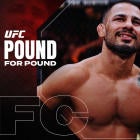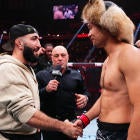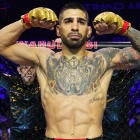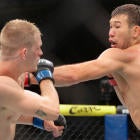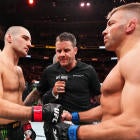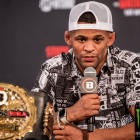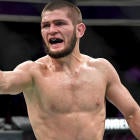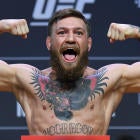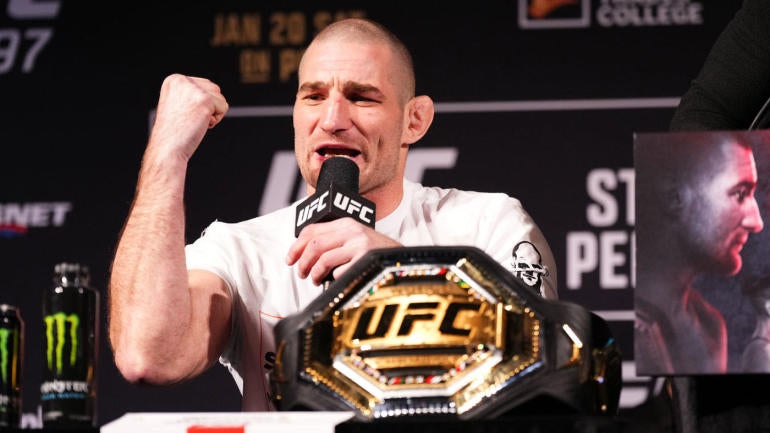
In April 2021, nearly one year after UFC's decision to boldly push forward with business as usual despite the global fears of the COVID-19 pandemic, Dana White appeared on Fox News' "Hannity" for what amounted to a victory lap.
To White's credit, his decision made UFC the only sporting event in town for most of the spring and summer of 2020 as the promotion rallied to fulfill its minimum number of events dictated by the landmark five-year distribution deal signed with ESPN in 2018 (and renewed the following year) that reportedly pays UFC around $300 million per year.
A huge part of the celebratory rant delivered by White, an outspoken Republican who has publicly campaigned for long-time friend and former President Donald Trump, surrounded just how little interest sports fans have in politics (an ironic speech, of sorts, considering he was appearing on an unabashed far-right talk show) and went on to rail hard against "woke athletes" in other sports like the NFL and NBA.
"When people tune in to watch sports, they don't want to hear that crap" White said. "They don't want to hear what your opinions are or who you're voting for [or] what you're doing. They want to get away from everything in their life and they want to focus on two, three, four hours; however long the sport is when you turned it on.
"If you want to listen to that stuff, turn on any other station, you will hear all of that stuff you want to hear. When you tune in to UFC, you are there to see fights."
It can certainly be surmised that, at the time, White was weaponizing an anti-political stance in sports as a way to justify his decision making during such a polarizing time of misinformation and uncertainty. Sick of being criticized for his flippant responses to the severity of the pandemic, White had even gone as far as having his team publish a four-minute video exposing media members who had questioned or doubted him (along with the threat of a full documentary that has yet to come to fruition).
Can't get enough boxing and MMA? Get the latest in the world of combat sports from two of the best in the business. Subscribe to Morning Kombat with Luke Thomas and Brian Campbell for the best analysis and in-depth news.
White, during his interview with "Hannity," was also quick to explain why UFC would never attempt to censor the views of any of its fighters, which is still consistent (for better or worse) today.
"There are certain fighters, male and female, who have their own religious and political beliefs or whatever, and we don't muzzle any of them, either," White said. "If they come out at the press conference and they want to talk this or that, or whatever it might be, it's their God-given right to do it. We don't muzzle anybody but we keep politics out of the sport."
Yet, nearly three years later, it's impossible to tune into a UFC broadcast without said politics being force fed in ways that extend far beyond anything subtle. And, given the events of Wednesday's UFC 297 media day in Toronto involving middleweight champion Sean Strickland, there's enough growing sentiment to debate whether unchecked freedom of speech for its athletes is the best thing for the brand or the reputation of the sport.
It's certainly not the longtime friendship between White and Trump that's the issue. But it's one thing for UFC to regularly comp the 2024 presidential candidate with front-row seats as a thank you for his years of support. It's another thing altogether for UFC to produce a documentary on Trump, as it did in 2018, titled "Combatant in Chief," which aired on UFC's Fight Pass streaming service in honor of the promotion's 25th anniversary.
It's also different when UFC, over the past six months, has used Trump's appearances at events as a way to make a larger and more profound statement about its own role in the ongoing culture war, which makes the merging of politics and sports so tasteless to begin with. Why else would UFC make it a point to televise Trump's walk out from the tunnel to his cageside chair before the start of each PPV with the same pomp and circumstance as a fighter?
DONALD TRUMP HAS ARRIVED! 🇺🇸#UFC295 pic.twitter.com/tcREA2aTKd
— UFC on TNT Sports (@ufcontnt) November 12, 2023
Had it just been a live shot of Trump, it could be justified as treatment no different than any other A-list celebrity who frequents UFC fights, from actor Jared Leto to retired NBA star Shaquille O'Neal. Instead, Trump's entrances find him adorned each time by the same cast of characters (White, UFC executive Hunter Campbell, conservative political commentator Tucker Carlson and musician Kid Rock) in an intentional statement that has often been memed online by Darth Vader's theme song,"The Imperial March," from the "Star Wars" franchise.
(The irony that Kid Rock aggressively boycotted Bud Light last April due to its promotional partnership with transgender influencer Dylan Mulvaney by shooting up cases of beer with a semi-automatic rifle in a viral protest video, only for White to strike a deal with Bud Light to become the official beer of UFC six months later seems to be lost on most.)
Chastizing White and UFC brass for nothing more than hypocrisy would largely be a vain waste of time, regardless of which side you sit politically, if that were the only grievance of the promotion at the moment. But that's where Strickland, who will make the first defense of his 185-pound title against heated rival Dricus du Plessis on Saturday, and his recent comments come into play.
Hearing Strickland say anything controversial should come as no surprise by this point for fans of the 10-year UFC veteran.
Whether or not he plays up his anti-establishment persona for commercial effect or not, Strickland has long played the role of wounded drifter who speaks whatever comes to his mind, regardless of consequence or reaction, and is ready to throw down at the drop of a hat, whether inside the cage (where he upset Israel Adesanya for the title in September) or outside of it (see his December crowd brawl with du Plessis at UFC 296).
Yet, it's the lack of consequences of any kind from UFC fighters like Strickland, or bombastic Trump cheerleader Colby Covington, from White over the past few years that has perpetuated a growing (and largely toxic) culture change within the UFC brand and, by extension due to its monopolistic control, the entire sport at large.
Trash talk, for example, has always been a huge part of the allure to combat sports. Insults and real-life tension are often played up for marketing purposes to build anticipation for the two fighters to enter the cage, only for respect and sportsmanship to (typically) win out when the fight has concluded. In many ways, this is the life cycle of fight promotion.
For any fan of the UFC, however, it has become difficult to overlook just how vicious, often for the sake of it, that press conferences and public promotional events have recently become. Look no further than back-to-back days in December ahead of UFC 296 in Las Vegas when the promotion rolled out a pair of decidedly dark press conferences riddled with homophobic slander.
Covington, whose shtick seems far more contrived than that of Strickland, went from unprovoked accusations of Stephen Thompson's father being a pedophile to implying to Ian Garry that the rest of the roster had slept with his wife. Covington then issued a now infamous claim to welterweight champion Leon Edwards that he would join his late father in hell after losing their fight, which forced the normally liberal White to finally address days later by saying, "we don't like this stuff, and we do everything in our power to make sure it doesn't happen again."
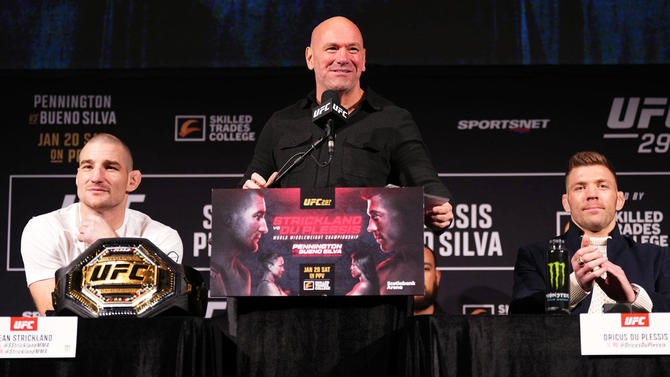
But Strickland, just one day later, picked up where Covington left off at a second press event by firing strays at anyone within his vicinity, including a series of distasteful debates with du Plessis, which included Strickland accusing him of sleeping with his trainer and "DDP" to repeatedly reference his opponent's history with being physically abused by his father.
It's one thing to dismiss inflammable comments between cage fighters as par for the course in a sport built upon violence and trauma. But that's just a lazy approach and one that would've been fine some 20 years ago when UFC held a much different place in the cultural zeitgeist, just years removed from its barbaric birth (and eventual ban from television and PPV). But UFC simply has too much to lose after working so hard to achieve mainstream acceptance, especially with it being so close to negotiation season for its next media rights deal.
And that's what brings us back to Wednesday, when Strickland sat in front of media members in Toronto and was asked by journalist Alexander K. Lee of MMAFighting.com about outspoken comments he made in recent years against the homosexual and transgender community. Lee intended on giving Strickland a forum to either amend or further explain his controversial remarks now that he has become a face of the promotion, which instead incited Strickland into a profanity laced tirade.
Adorned in a t-shirt currently for sale on his website which reads, "A Woman In Every Kitchen, A Gun In Every Hand," Strickland quickly turned it into a political debate by chastising U.S. President Joe Biden and Canadian Prime Minister Justin Trudeau. He also called Lee "a weak, pathetic man" for implying he would still love his children even if they were gay and closed by telling Lee he's "the enemy to our f---ing world" for asking such questions to begin with.
The only thing worse than Strickland's hateful comments were the reactions from a flood of supportive MMA fans on social media and the lack of reactionary comments from White or UFC parent company Endeavor. If you're keeping score at home, it's the same deafening silence that lingered in the aftermath of White being caught on tape assaulting his wife one year ago on New Year's Eve, which came and went without a press release from either UFC or Endeavor, let alone a punishment.
This is the same White who, when approached by media members after UFC 293 in September to react to homophobic slurs uttered by Manel Kape and Charles Radtke during separate postfight interviews, said both fighters apologized backstage on their own and weren't prompted to do so by the promotion.
"We make mistakes, I am not holier than though, either," White said. "We have all been in positions where we make mistakes but, like I always say, it's how you carry yourself after you make a mistake. I don't make anyone apologize for anything. You do what you want, you are grown men and women."
It's fair to question whether White's liberal stance against his own fighters has become a major part of the problem.
For fans of Strickland, most of which double as outspoken conservatives, his outlandish remarks were seen as heroic and the reason he connects so deeply with the UFC's fan base thanks to his unapologetic moral code and his recent speaking out against everything from materialism (which is why he has deemed the UFC title belt as worthless) to the Matrix-style brainwashing that he believes has ruined American society.
In many ways, that's the essence of what makes Strickland so unique as the new template of MMA star, which has emerged in this reckless and highly political modern UFC culture. Strickland, to his credit, has played the part of sarcastic, counterculture prophet almost too perfectly; a less refined version of former WWE star "Stone Cold" Steve Austin, who also isn't afraid to show his vulnerabilities, as evidenced by the tears he shed to comedian and podcaster Theo Von while reliving his childhood trauma on a recent episode of "This Past Weekend."
Yet, for all of the talk from Strickland's supporters about his first amendment rights and the brash nature in which he verbally attacks so many different UFC fighters from interview to interview, it was a bit surprising to hear him reveal this week that he reached out to du Plessis on social media and pleaded with him to not bring up his father or his traumatic past again (while throwing in an added threat of stabbing him should he violate their agreement).
Validating Strickland's hate speech as acceptable, simply because one might agree with the political root of his grudge, doesn't mean there's a place for this kind of talk within MMA, especially since it had nothing to do with promoting a fight. What does that say about the UFC, or anyone associated with it, that the recent vernacular that has taken over the sport has become so accepted in short term as what happens when you put a cage fighter in front of a microphone.
For UFC, this can only be seen as a regression. In 2013, the promotion fined Nate Diaz $20,000 and suspended him three months for using a homophobic slur on Twitter aimed at fellow fighter Bryan Caraway. Two years earlier, White cut loose bantamweight Miguel Torres for making a crass joke online about rape.
But in the new UFC, if you take issue with anything Strickland said or the gravity of what unchecked hate speech can do to a culture, prepare to be met online with political slander and a series of insults ranging from "snowflake" to far, far worse.
The reality is, this has nothing to do with politics, at all. This is about human decency, love and empathy towards others. And for anyone preaching how virtues like that have no place in a sport in which two warriors are locked in a cage aimed at removing one another from consciousness, and never did, you couldn't be more wrong.
This is not the fight game most of us first fell in love with. Those days, albeit with a few exceptions more consistent with less politically correct times, were largely contested under the honor-fueled cloak of the moral samurai code Bushido, where respect for others -- and oneself -- trumped just about anything else associated with the sport of MMA we have come to know in 2024.
Think Anderson Silva, Georges St-Pierre, Fedor Emelianenko and many of the other legendary warriors who were part sportsman, part gentleman and all class, without sacrificing any of the danger each brought into the fighting surface along with them.
Yes, there's still a place for clever trash talk in MMA when done right. But let's not forget how much respect, not to mention courage and nobility, have long been the tenets in which martial arts competition as sport was first built upon.
This isn't necessarily a rant against one fighter, one promoter or even one regrettable word taken too far. This is an indictment upon a culture which, by sacrificing decency in exchange for unchecked speech, have muddied the waters by so purposefully merging the two things White once said some 33 months ago never belonged on the same broadcast in the first place.
Who wins UFC 297: Strickland vs. du Plessis, and how exactly does each fight end? Visit SportsLine now to get detailed picks on UFC 297, all from the MMA expert who profited more than $6,200 in 2022, and find out.








